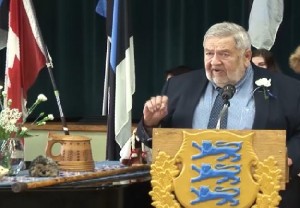Noteworthy examples are John Pilger’s on-line postings which castigate the US and render the Kremlin blameless during Russia’s massive military deployment on Ukraine’s border.
“Biden lies about Russia. It was the US that overthrew the elected govt (sic) in Ukraine in 2014 allowing NATO to march right up to Russia’s western border. It was the US that pledged to Gorbachev that NATO would never expand beyond Berlin.”
Pilger’s tweets have been enthusiastically picked up by different accounts – 87 so far - advancing Russian propaganda. Activity on accounts spreading Russian dis-information has increased dramatically in recent weeks.
Pilger is a veteran Australian journalist honoured with a place in the country’s Media Hall of Fame. Rabidly anti-Washington, Pilger aligns himself perfectly with Moscow’s stance. His credibility on other issues has been cleverly exploited by the Kremlin. With 210,000 followers of his Twitter commentary and with numerous other accounts following his tweets, Pilger is a valuable source for the Kremlin and aptly epitomizes Western politicians and journalists giving Russians ostensibly reputable public figures to quote.
A well-known American politician with a huge far-right following is a typical asset of Russia in the West: US Congressman Matt Gaetz, a shrill proponent of Trump’s “Big Lie”, with 2.6 million followers on two Twitter accounts, insists that the US not support Ukraine’s defense against Russia. This has been shared by 2,600 other accounts with at least 12 singularly devoted to spreading pro-Russian propaganda.
Advertisement / Reklaam
Advertisement / Reklaam
Many mainstream and far-right accounts, especially those of recognized journalists, have been used by the Kremlin propaganda machine. In the shift to using well-known Western sources, Russia is now veering from questionable disinformation of anonymous or Russian accounts to genuine comments from those who have now been finally exposed as Kremlin proxies. To readers, the Western accounts seem more mainstream, seem more credible and have sizable followings. An accurately reliable analysis of the content, penetration and reach of Russian disinformation about the Ukrainian crisis can be done measuring the activity of Twitter accounts. Mythos Labs has assessed multiple aspects of this Russian propaganda campaign.
Between December 1 and January 5, 697 anti-Ukraine accounts were identified, compared to a total of just 58 During November. This was a 375% increase over that period.
The focus has also shifted to English, rather Russian language audiences. This increased to 57% in December, up from 34% in November. Putin was definitely determined to undermine support for Ukraine in the West.
With an increased English language content, Russia’s narrative now emphasizes the damage Western countries could inflict on themselves if they stand by Ukraine. The vilification of Ukraine is now a secondary theme. As an example, Republican Congressman Gaetz’s messaging: It benefits the USA to concentrate on the US-Mexican border and not be involved with the Russia-Ukraine conflict which would bring it harm.
Other US sources have found intense replay in Russian media. Fox News commentators such as Trump’s former CIA director and Secretary of State, Mike Pompeo and Fox’s most prominent on-air figure, Tucker Carlson both praise Putin as a strong, forceful leader, his self-assurance, single-mindedness and decisiveness in opposing the West. To observers, Pompeo’s and Carlson’s adulation of Putin shows their preference of an authoritarian rather than democratic leadership. This matches their fawning support of Trump.
Advertisement / Reklaam
Advertisement / Reklaam
Russian media, as expected, have repeatedly replayed clips of Western commentators of the same ilk as the Fox News personalities.Undoubtedly the intensification of anti-Ukrainian propaganda has swayed the Russian population to shift their views about a conflict with Ukraine. A few months ago, Russians did not favour a war, but were resigned to it, saying it was inevitable in spite of their reluctance to support it.
New polls indicate that more Russians, some 50%, support a Russian incursion into Ukraine, that the instigator of the current crisis is the West and that Ukraine should be part of Russia, an outcome that Putin insists is historically justified.
This was aptly reflected by the staff of Russian state-owned TV. When Putin announced his official recognition of the Luhansk and Donetsk areas, champagne bottles were popped and a celebratory toast offered on air. The unabashed revelry demonstrated the effectiveness of Russia’s massive disinformation campaign.
(to be continued)
Laas Leivat

























